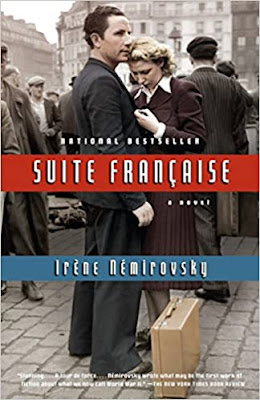✩✩✩✩✩
Beginning in Paris on the eve of the Nazi occupation in 1940, as Parisians flee the city, human folly surfaces in every imaginable way: a wealthy mother searches for sweets in a town without food; a couple is terrified at the thought of losing their jobs, even as their world begins to fall apart. Moving on to a provincial village now occupied by German soldiers, the locals must learn to coexist with the enemy—in their town, their homes, even in their hearts.
When Irène Némirovsky began working on Suite Française, she was already a highly successful writer living in Paris. But she was also a Jew, and in 1942 she was arrested and deported to Auschwitz, where she died. For sixty-four years, this novel remained hidden and unknown.
Genre: historical fiction
Publication date: April 2007 (for the current paperback version)
Mature content: yes, taking into account the book depicts a situation of war
Review: I came across this book purely by chance. I had no previous knowledge of Irène Nèmirovsky or any of her other books, and I admit I was impressed. Maybe not because of the quality of the writing - this is a book that remained incomplete and was never truly edited. I'm pretty sure Irène would have changed some parts, maybe even some characters - her own notes, included at the end of this edition, confirm it.
However, I'm convinced it holds an immense historical value since, although through fictional characters, we are treated to a first row description of the first days of the German invasion of France (the first part of the book) and the German occupation (the second part). In some ways, it reads almost like a journal.
I also love that Irène does not depict the French as good and the German as evil, as others would probably try to do in her situation. Actually, it's kind of the other way around - most Frenchmen are shown as egotistical creatures just focused on saving themselves, often at the expense of their own countrymen. And some of the Germans come across as sympathetic and educated. In a way, I believe the author is trying to tell us there is good and bad everywhere, but that wars do tend to bring out the worst (and the best) of people.
Sadly, we will never know how Irène Némirovsky planned to end her story, since she perished in Auschwitz in 1942. At the end of the edition of Suite Française I have read there is a compilation of letters, most of them written by her husband, trying to find her whereabouts, and making every effort possible to get her back. Unfortunately, most went unanswered, and then her husband suffered the same fate. All in all, it seems a miracle that this book has made it to our bookshelves.
There has been a film adaptation, focused mainly on the second part of the book. In my opinion the film is wonderful, with a lovely sound track too, but don't expect to see a reflection of Bruno and Lucille's love story in the book - they do get somewhat involved, but not to the extent the film portrays, at least not explicitly.
Happy readings!
This post may contain affiliate links. As an Amazon Associate I earn from qualifying purchases.



Comments
Post a Comment